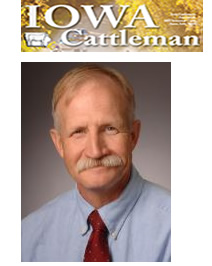Iowa Beef Center director column
September 2022
A culture of safety on the farm and ranch
National Farm Safety week is the third week in September. This is a good time to be intentional about farm safety. Agriculture is among the most dangerous jobs and cattle production is four times more dangerous than the rest of agriculture. Actually, beef production immediately follows logging, which is the most dangerous profession. General farm hazards may be related to farm equipment, grain handing, chemical and electrical hazards.
In addition to general farm hazards, beef producers have additional risks associated with working around unpredictable animals, risks associated with silage piles and bunkers (roll-overs and cave-ins) and gas poisoning risks associated with silos and manure pits. All of these activities increase in the fall during the fall run and harvest.
It is a good idea to periodically review your facilities and equipment for potential issues that could harm people or cattle. Be sure everyone is trained to do their task, whether it is equipment operation or low stress cattle handling, and that they know the potential hazards. As silage piles and bunkers have gotten larger so has the potential risk of rollovers during packing and cave-ins during feed out. Develop a safety protocol around silos and silage and make sure everyone is aware of the potential dangers.
But safety is more than just training. Safety must be built into the operation or family. In feedlots, for example, is there someone designated as the safety “champion” who is the point person to identify training needs, facility upgrades or changes? Are employees encouraged to regularly discuss safety concerns? In families are farm hazards discussed regularly? As a former careless teenager, I understand how carelessness can lead to accidents. Luckily, I lived to tell about it. What about using a safety tip or tool as the next 4-H communication presentation or FFA project?
One safety item that is a must-have if you are handling manure from deep pit cattle barns or lagoons is a hydrogen sulfide monitor. This can save a life. Our Extension Manure Management specialist Dan Anderson (@DrManure) has developed this fact sheet (https://store.extension.iastate.edu/product/Hydrogen-Sulfide-Safety-Monitoring). This is a good place to start for more information.
Handling cattle using low stress methods improves the welfare of the cattle and safety of their handlers. It is also part of the Beef Quality Assurance (BQA) program. If you are not yet certified, we have upcoming training and certification sessions near you, including BQA Transportation (BQAT) certification https://www.iabeef.org/cattlemens-corner/iowa-bqa. BQA is a national program administered by the Iowa Beef Industry Council (IBIC) in Iowa. The Iowa Beef Center partners with IBIC to conduct the trainings.
We are hosting three Fencing and Grazing Clinics this month: September 7 at the ISU Armstrong Research Farm near Lewis, September 12 at the ISU McNay Farm south of Chariton, and September 14 at the Hansen Ag Student Learning Center on the ISU Campus in Ames. The program will feature fencing demonstrations, paddock layout considerations, information on pasture leases and more. Contact Erika Lundy-Woolfolk or Beth Reynolds for more information.
September is the month when cattle on feed are at their seasonal lows. This is a great time for pen maintenance in feedlots. In addition to routine pen scraping, rebuilding and reshaping of mounds, and cleaning of solids settling basins are good management practices. This will allow for better runoff and snow removal as well as cleaner cattle and perhaps better hoof health.
The IBC at Iowa State University serves as the university’s extension program to cattle producers. Our center comprises a team of faculty and staff from the College of Agriculture and Life Sciences, the College of Veterinary Medicine and Iowa State University Extension and Outreach. We work together to develop and deliver the latest in research-based information to improve the profitability and vitality of Iowa’s beef industry. If you’d like to be notified of updates on progress of research projects or programs that might be coming to your area, please subscribe to our “Growing Beef” newsletter by following the link on our website, www.iowabeefcenter.org. If you have a question, use our “Ask our Experts” link. Also, feel free to call us at 515-294-BEEF or email us at beefcenter@iastate.edu. You can also follow @iowabeefcenter on Twitter, YouTube and Instagram and now AgFuse.

